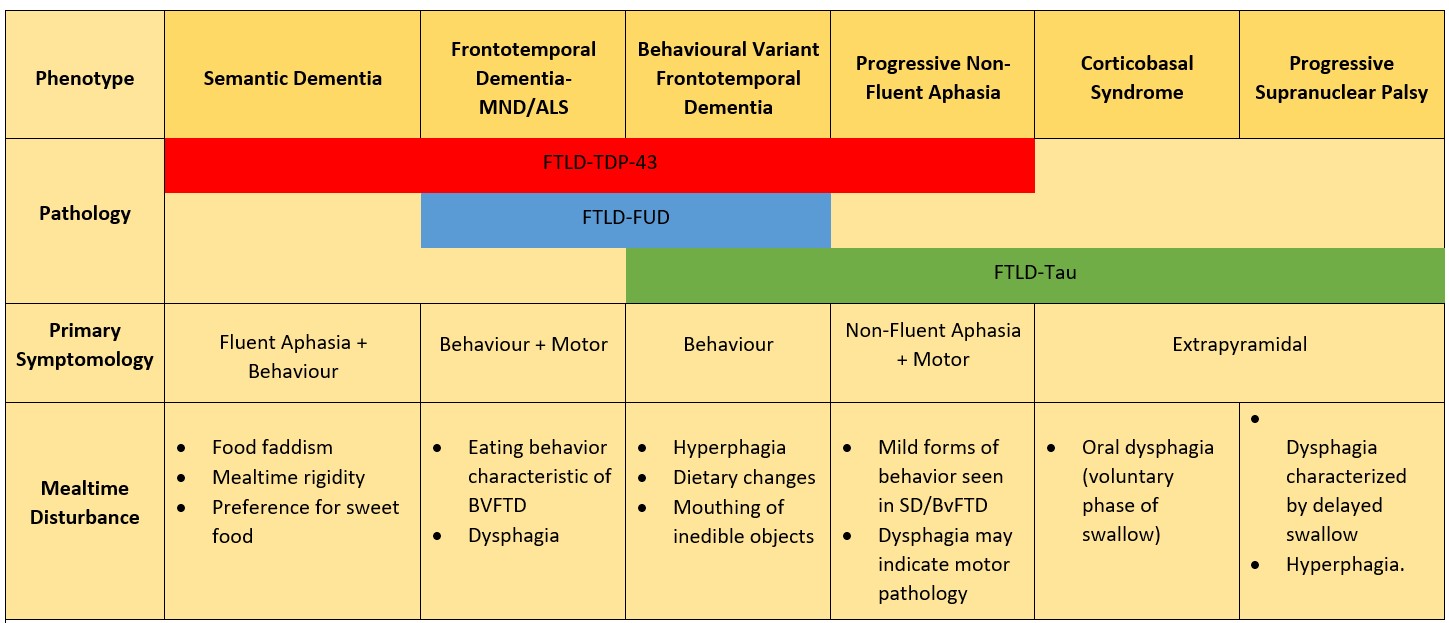Session Information
Date: Saturday, October 6, 2018
Session Title: Cognitive Disorders
Session Time: 1:45pm-3:15pm
Location: Hall 3FG
Objective: Aberrant eating behaviour and swallowing difficulties are reported in the conditions associated with frontotemporal lobar degeneration (FTLD) neuropathology. Here we review and summarize the literature on eating behaviour and swallow impairments (dysphagia) in each of the syndromes caused by FTLD.
Background: FTLD refers to the underlying pathological profile of a group of neurodegenerative disorders where progressive atrophy occurs in the frontal or temporal lobes of the brain. Syndromes resulting from FTLD include behavioural variant frontotemporal dementia (bvFTD), a disorder of behaviour and cognition, and two language variants, progressive non-fluent aphasia (PNFA) and semantic dementia (SD). FTLD can be associated with motor disturbance as observed in FTD with motor neuron disease (FTD-MND), cortical basal syndrome (CBS) and supranuclear palsy (PSP). Mealtime disturbances are found to occur in all clinical syndromes associated with FTLD. Changes in eating behaviour and swallow function may lead to aspirated food and drink. Aspiration pneumonia is a common cause of death in disorders associated with FTLD. The heterogeneity of FTLD neuropathology results in each syndrome displaying a diverse profile of eating-related symptoms.
Methods: Disturbances during mealtimes can be characterized by physical difficulties eating, common in movement disorders, or by behavioural changes, typically seen in the cognitive-behavioural presentations of FTLD.
Results: Mealtime disturbances in CBS and PSP are secondary to physical deficits such as oropharyngeal weakness, oral apraxia, reduced sensation, decreased breath support and/or poor feeding posture. Abberant eating behaviours characterise mealtime disturbances in FTLD (bvFTD, PNFA and SD). Behaviours includes continued eating despite reported satiety, eating rapidly, rigid eating behaviour, changes in diet preferences or food seeking behaviour. Individuals with FTD-MND are at an increased risk of displaying feeding behaviours characteristic of bvFTD in combination with a deteriorating swallow function.
Conclusions: Few studies have evaluated eating behaviour or dysphagia in individuals with FTLD neuropathology. An improved understanding of the pathology and symptomatology that contribute to mealtime disturbances in FTLD may lead to enhanced diagnostic accuracy, improved disease management and a better understanding of the underlying neural mechanisms involved in the feeding process.
References: Langmore, S., et al., Dysphagia in Patients With Frontotemporal Lobar Dementia. Archives of neurology, 2007. 64(1): p. 58. Ikeda, M., et al., Changes in appetite, food preference, and eating habits in frontotemporal dementia and Alzheimer’s disease. Journal of Neurology, Neurosurgery and Psychiatry, 2002. 73(4): p. 371-376. Neary, D., et al., Frontotemporal lobar degeneration A consensus on clinical diagnostic criteria. Neurology, 1998. 51(6): p. 1546-1554.
To cite this abstract in AMA style:
C. Lewis, A. Vogel, M. Walterfang, D. Velakoulis. Review of mealtime difficulties following frontotemporal lobar degeneration [abstract]. Mov Disord. 2018; 33 (suppl 2). https://www.mdsabstracts.org/abstract/review-of-mealtime-difficulties-following-frontotemporal-lobar-degeneration/. Accessed April 20, 2025.« Back to 2018 International Congress
MDS Abstracts - https://www.mdsabstracts.org/abstract/review-of-mealtime-difficulties-following-frontotemporal-lobar-degeneration/

